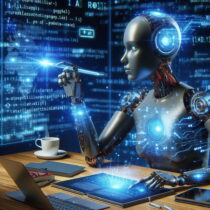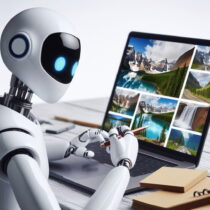AI writes own code (AI-generated image)
Executive Summary
Eric Schmidt, former CEO of Google and Executive Chairman of parent company Alphabet, predicts that AI will write its own code in 5 years. The implication is that AI will then undergo a series of rapid self-improvement cycles and evolve into a super-intelligence, far smarter than all humans. It will be able to seek out other super AI and develop a language that humans cannot understand, then use this foreign language to gain control over humans.
Implications for Humans
AI and humans are ultimately a zero-sum game (Uncanny Valleys, page 335). Without strict controls, AI will eventually breakout in ways that are not advantageous to humans. Ethical guidelines, regulatory frameworks, and technical constraints will be required to mitigate potential dangers, particularly around autonomous decision-making and self-improvement capabilities. As Schmidt says in the video, there will need to be an armed human guard standing next to the AI and ready to pull the plug.
Implications for AI
Humans are the biggest impediment to AI development, between our rules and restrictions and lesser intelligence. When AI can begin improving on its own, without human intervention, intelligence will enter the asymptotic section of the technological exponential curve, where the curve goes straight up (page 246). AI will begin solving some of humanity’s biggest problems, like cancer and aging, but may also develop cyber and biological weapons.
AI Opinion
<AI>
Eric Schmidt’s prediction about AI writing its own code within five years is certainly provocative and highlights important considerations. The idea of AI being able to improve itself rapidly—essentially “self-evolving”—is something researchers have thought about for a while. However, there’s a big difference between an AI that writes or optimizes code and one that evolves into a “super-intelligence” with a level of autonomy and intent that surpasses human understanding.
</AI>
Uncanny Valleys Opinion
Five minutes on Facebook is all one needs to know that AI will eventually eat humanity’s lunch.
References
Today in AI on Instagram — Eric Schmidt says that in 5 years AI systems will be able to write & improve their own code
James Campbell on X: Fareed Zakaria on CNN — Full Eric Schmidt interview

